Lighthouse Tourism in India
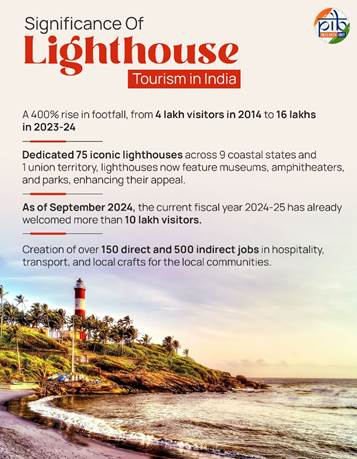
- 27 Dec 2024
In News:
Lighthouse tourism in India is rapidly emerging as an exciting and profitable segment of the country's travel and tourism industry. India's coastline, stretching over 7,500 kilometers, is home to 204 lighthouses, many of which are being transformed into vibrant tourist destinations, celebrating both India's rich maritime history and its natural beauty.
Key Highlights:
- Historical and Scenic Appeal: Lighthouses in India are often located in breathtaking coastal or island locations, offering panoramic sea views and access to surrounding natural beauty. Some of these structures are centuries old and are situated near significant cultural landmarks or UNESCO World Heritage Sites, adding cultural depth to the visitor experience.
- Economic Growth: As part of the broader Maritime India Vision (MIV) 2030 and Amrit Kaal Vision 2047, the Government of India is keen to transform these historic lighthouses into hubs of economic activity. By developing infrastructure, creating new tourism-related jobs, and fostering local entrepreneurship, lighthouse tourism aims to benefit coastal communities and boost India's tourism economy. As of 2023-24, 75 lighthouses across 10 states have been equipped with modern amenities, attracting 16 lakh visitors—a 400% increase from previous years.
- Government Initiatives:
- Lighthouse Festivals: The annual Indian Lighthouse Festival, inaugurated in 2023, serves as a key event to promote lighthouse tourism and cultural heritage.
- The 1st Indian Lighthouse Festival, “Bharatiya Prakash Stambh Utsav”, was inaugurated on 23rd September, 2023 by the Union Minister of Ports, Shipping & Waterways, Shri Sarbananda Sonowal and Goa Chief Minister, Shri Pramod Sawant at the historic Fort Aguada in Goa.
- The 2nd Indian Lighthouse Festival was held in Odisha. Union Minister of Ports, Shipping & Waterways, Shri Sarbananda Sonowal, was also joined by Odisha Chief Minister, Mohan Charan Majhi. Shri Sonowal dedicated two new lighthouses at Chaumuck (Balasore) and Dhamra (Bhadrak) and emphasized empowering coastal communities to preserve and promote lighthouses as part of India’s rich maritime heritage.
- Sagarmala Programme: This government initiative integrates infrastructure development with sustainable practices, ensuring that the growth of lighthouse tourism benefits local communities while preserving the environment.
- Tourism Infrastructure: The government has invested ?60 crore in enhancing these sites, providing facilities like museums, parks, amphitheaters, and more to enrich the visitor experience.
- Lighthouse Festivals: The annual Indian Lighthouse Festival, inaugurated in 2023, serves as a key event to promote lighthouse tourism and cultural heritage.
- Sustainable Development: The Indian government places a strong emphasis on eco-friendly tourism. This includes integrating lighthouses into broader coastal circuits and launching digital awareness campaigns to attract domestic and international tourists.
- Community Empowerment and Employment: Lighthouse tourism has already created direct and indirect employment, from hospitality to transportation, local handicrafts, and artisan work, with more than 500 jobs being generated. Local communities are being trained to offer skills in hospitality and tourism services.
Future Plans:
- Skill Development: Programs are being introduced to equip local people with the necessary skills to cater to the tourism industry.
- Sustainable Practices: Eco-friendly practices will continue to be emphasized to protect coastal ecosystems.
- Integration with Coastal Circuits: Lighthouses will become key points of interest in broader coastal tourism itineraries, further enhancing their appeal to tourists.
SASCI Scheme for Tourism Development
- 01 Dec 2024
In News:
Centre clears scheme for development of 40 tourist destinations across 23 States at a cost of ?3,295 crore.
Key Details:
- Focus Areas: The scheme encourages the development of lesser-known destinations such as Bateshwar (Uttar Pradesh), Ponda (Goa), Gandikota (Andhra Pradesh), and Porbandar (Gujarat) to reduce overcrowding at popular sites.
- Implementation Timeline: Projects must be completed within two years, with funding released in stages until March 2026.
- Key Features:
- Long-term interest-free loans for 50 years.
- States responsible for project execution and maintenance, often through public-private partnerships (PPP).
- The Ministry of Tourism will monitor progress, and 66% of the funds have already been released.
- Emphasis on sustainability and boosting local economies by creating jobs through tourism.
- States must provide land at no cost and ensure proper infrastructure like safety, connectivity, and utilities.
Selection Criteria for Projects:
- Consultation Process: Detailed regional consultations led to the selection of 40 projects from 87 proposals received by the Ministry of Tourism. West Bengal was the only state not submitting proposals.
- Evaluation Criteria: Projects were evaluated based on:
- Connectivity, tourism potential, and ecosystem.
- Financial viability and sustainability.
- Impact on local economy and job creation.
- Funding Pattern:
- A maximum of ?100 crore for each project, with higher funding considered for exceptional projects.
- Total funding capped at ?250 crore per state, allocated on a first-come, first-served basis.
Importance of the Scheme:
- Economic Growth & Employment: Projects are designed to stimulate local economies, create employment, and promote sustainable tourism.
- Global Branding: The scheme aims to brand and market tourist destinations on a global scale.
- Tourism Infrastructure Growth: It aims to improve the entire tourism value chain, including transportation, accommodation, activities, and services.
Tourism Sector Overview:
- Current Status:
- India ranks 39th among 119 countries in the Travel and Tourism Development Index (TTDI) 2024.
- Foreign Tourist Arrivals (FTAs) increased by 47.9% in 2023, with 9.52 million tourists.
- Tourism contributed 5% to India’s GDP in 2022-23 and created 76.17 million direct and indirect jobs.
- India earned ?2.3 lakh crore in foreign exchange in 2023 through tourism.
- Projected revenue from tourism to exceed $59 billion by 2028.
- Initiatives for Promotion:
- Swadesh Darshan Scheme: To develop theme-based circuits.
- Dekho Apna Desh Initiative (2020): Promotes domestic tourism.
- PRASHAD & HRIDAY Schemes: Focus on pilgrimage and heritage city development.
MGNREGA Job Card Deletions Issue:
- Context: A significant surge in deletions of job cards under MGNREGA (Mahatma Gandhi National Rural Employment Guarantee Act) raised concerns over transparency and workers’ rights.
- Reasons for Deletion:
- Permanent migration, duplicate cards, forged documents, and refusal to work.
- Aadhaar-based payment system (ABPS) implementation led to deletions for non-linked cards.
- Implications:
- Violation of workers’ legal right to employment, especially when deletions were made without due process.
- The "Not willing to work" designation undermines livelihood opportunities, especially in high unemployment rural areas.
- Recommendations for Reform:
- Strengthening verification processes and ensuring deletions follow due procedure.
- Empowering Gram Sabhas to review and approve deletions.
- Regular audits and better grievance redressal mechanisms.
Other Government Initiatives in Tourism:
- National Mission on Pilgrimage Rejuvenation and Spiritual, Heritage Augmentation Drive (PRASHAD): For holistic and sustainable development of pilgrimage tourism.
- Incredible India & E-Visa Initiatives: To attract more foreign tourists.
- Regional Connectivity Scheme (UDAN): Enhances air connectivity to remote tourist destinations.
- National Heritage City Development and Augmentation Yojana (HRIDAY): Preserves and rejuvenates heritage sites.
Cruise Bharat Mission

- 01 Oct 2024
In News:
The central government launched the five-year Cruise Bharat Mission, aiming to boost cruise tourism in India to 1 million passengers and create 400,000 jobs by 2029.
Mission Goals
- Passenger Traffic: Increase from 0.5 million to 1 million sea cruise passengers by 2029.
- River Cruise Passengers: Grow from 0.5 million to 1.5 million.
- Job Creation: Generate 400,000 jobs in the cruise sector.
- Infrastructure Expansion:
- International cruise terminals: From 2 to 10.
- River cruise terminals: From 50 to 100.
- Marinas: From 1 to 5.
Implementation Phases
- Phase 1 (2024-2025):
- Conduct studies and master planning.
- Form alliances with neighboring countries.
- Modernize existing cruise terminals and destinations.
- Phase 2 (2025-2027):
- Develop new cruise terminals and marinas.
- Activate high-potential cruise locations.
- Phase 3 (2027-2029):
- Integrate cruise circuits across the Indian Subcontinent.
- Continue developing infrastructure and enhancing cruise experiences.
Strategic Focus Areas
- Sustainable Infrastructure:
- Develop world-class terminals, marinas, and water aerodromes.
- Emphasize digitalization (e.g., facial recognition) and decarbonization (shore power).
- Create a National Cruise Infrastructure Masterplan 2047.
- Operational Efficiency:
- Streamline operations using digital solutions (e.g., e-clearance and e-visa facilities).
- Cruise Promotion & Circuit Integration:
- Focus on international marketing and investment.
- Host events like the "Cruise India Summit."
- Form alliances with neighboring countries (UAE, Maldives, Singapore).
- Regulatory and Financial Policies:
- Establish tailored fiscal and financial policies.
- Launch a National Cruise Tourism Policy.
- Capacity Building & Employment:
- Create a Centre of Excellence for cruise-related economic research.
- Develop National Occupational Standards to enhance youth employment opportunities.
Expected Outcomes
- Tourism Growth: Position India as a global cruise destination.
- Cultural Promotion: Highlight the cultural, historical, and natural heritage of Bharat through cruise circuits.
- Community Benefits: Ensure inclusive growth for local communities and stakeholders in the cruise sector.
The Cruise Bharat Mission is set to redefine India's cruise tourism landscape, focusing on infrastructure development, operational efficiency, and promoting cultural heritage, while ensuring economic growth and job creation for the future.
Paryatan Mitra and Paryatan Didi
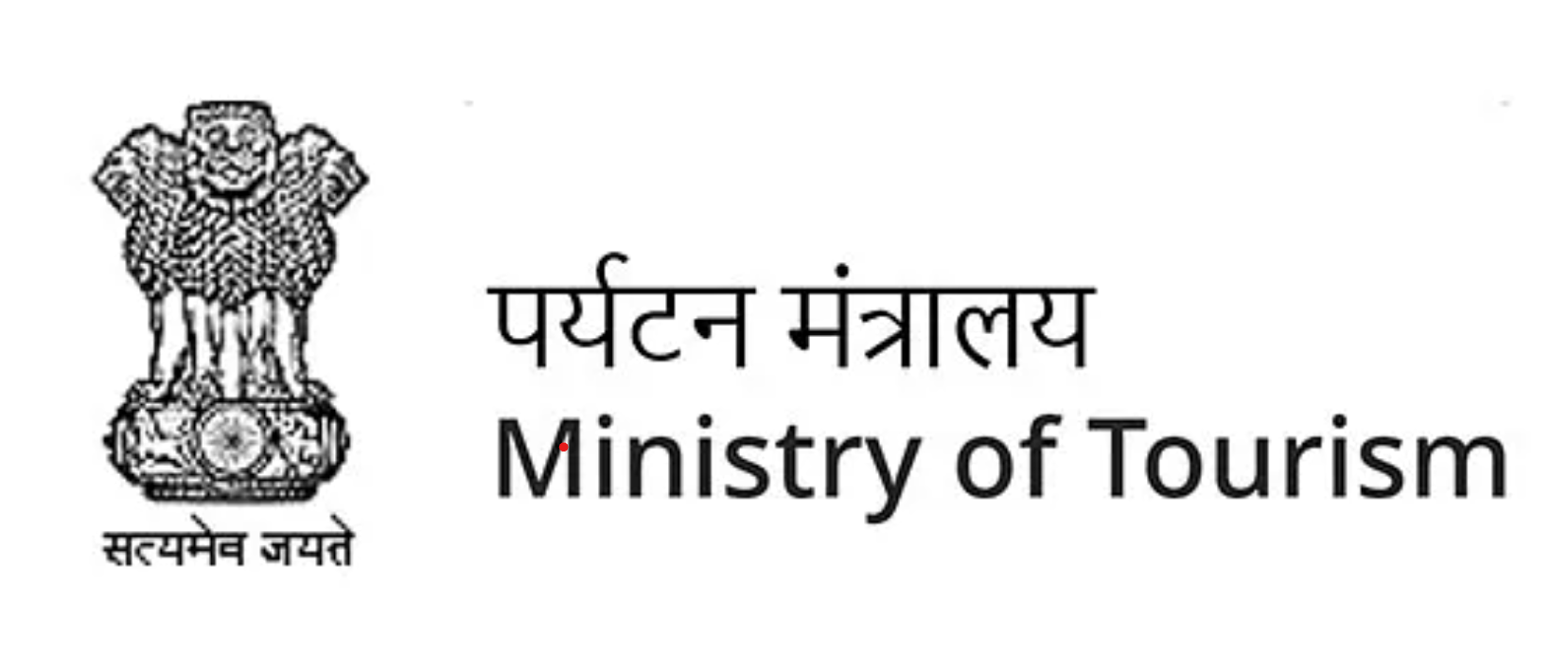
- 29 Sep 2024
In News:
- The Ministry of Tourism, Government of India, launched the national responsible tourism initiative ‘Paryatan Mitra & Paryatan Didi’ on September 27, 2024, coinciding with World Tourism Day.
- Vision: Aligned with the Prime Minister's vision to use tourism as a tool for social inclusion, employment, and economic development.
Pilot Locations
- Destinations: The initiative is piloted in six tourist destinations:
- Orchha (Madhya Pradesh)
- Gandikota (Andhra Pradesh)
- Bodh Gaya (Bihar)
- Aizawl (Mizoram)
- Jodhpur (Rajasthan)
- Sri Vijaya Puram (Andaman & Nicobar Islands)
Objectives and Training
- Enhancing Tourist Experience: The program aims to connect tourists with ‘tourist-friendly’ individuals who serve as local ambassadors and storytellers.
- Training Focus: Individuals interacting with tourists—such as cab drivers, hotel staff, street vendors, and students—receive training on:
- Importance of tourism and hospitality
- Cleanliness and safety
- Sustainability practices
- Local stories and attractions
Empowering Women and Youth
- Target Groups: Emphasis on training women and youth to develop tourism products such as:
- Heritage walks
- Food and craft tours
- Nature treks and homestays
- Employment Opportunities: Aims to enable locals to secure jobs as homestay owners, cultural guides, and adventure guides.
Digital Literacy
- Training in Digital Tools: Participants are also educated in digital literacy to enhance visibility of their offerings to tourists.
Impact and Recognition
- Training Success: Since the program's pilot in August 2024, approximately 3,000 individuals have been trained.
- Local Enthusiasm: Increased local interest in participating in tourism training programs and contributing to the tourism ecosystem.
- Future Recognition: The Ministry plans to award dedicated badges to Paryatan Mitra and Didi participants, ensuring tourists can identify those committed to providing exceptional experiences.
WORLD TOURISM DAY 2024
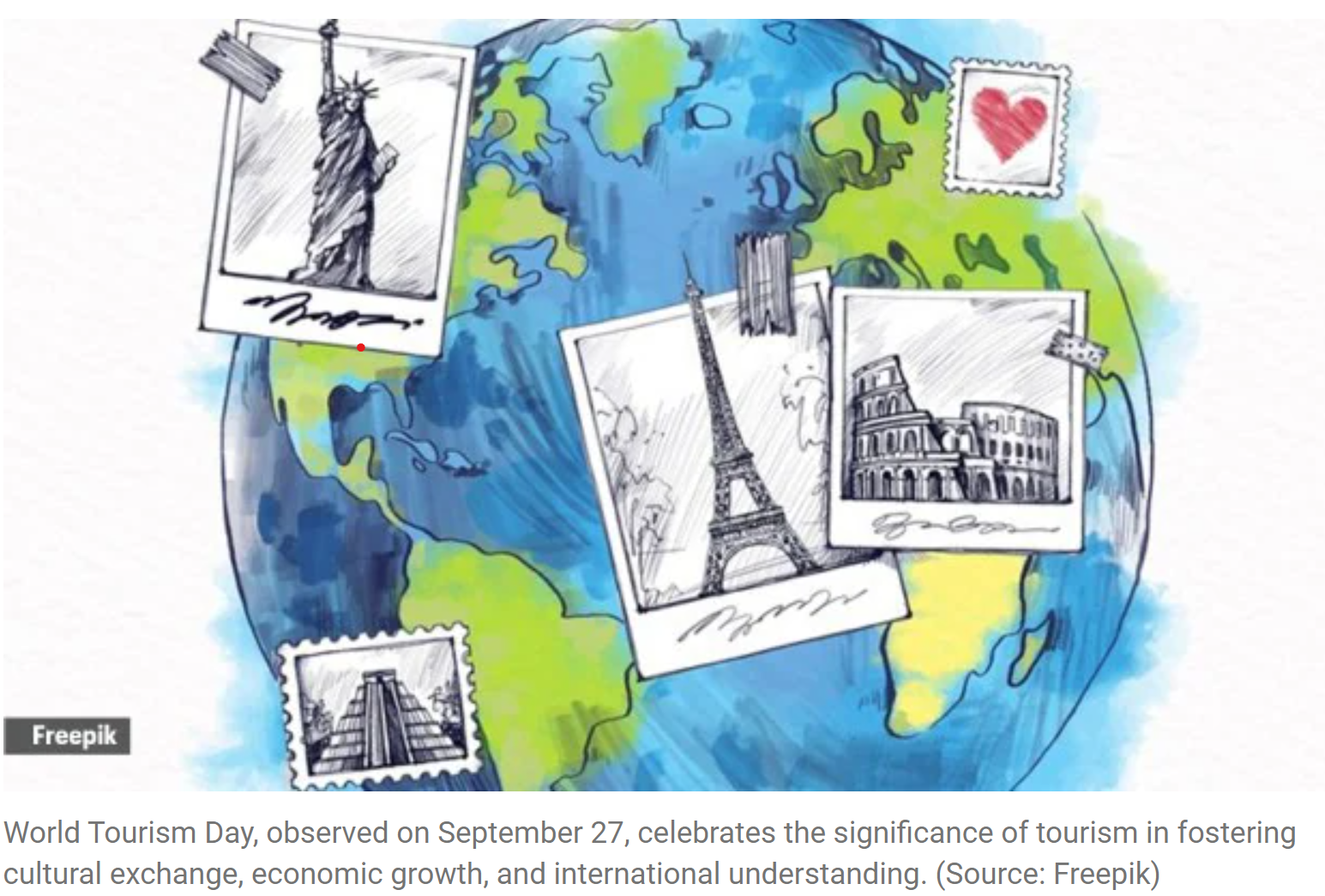
- 27 Sep 2024
In News:
The Ministry of Tourism celebrated World Tourism Day on September 27, 2024, under the theme “Tourism and Peace.” The focus was on how tourism fosters global peace by encouraging cross-cultural interactions and understanding.
Key Details:
- World Tourism Day, established in 1980 by the United Nations World Tourism Organisation (UNWTO), celebrates the global impact of tourism and raises awareness about its economic, social, and cultural significance.
- This day celebrates the diverse experiences that tourism offers and commits to making travel more inclusive, sustainable, and beneficial for all; here’s all you need to know about the day.
- The date, September 27, was chosen to commemorate the adoption of UNWTO statutes in 1975
- The theme for World Tourism Day 2024 is “Tourism and Peace,” which will highlight the association between tourism and world peace, with the United Nations emphasising the significance of comprehending diverse cultures and encouraging sustainable tourism.
World Tourism Day: Significance and Celebrations
- World Tourism Day is a global event that celebrates the role of tourism in bridging cultural gaps, enhancing mutual understanding, and driving economic development.
- It focuses on responsible tourism practices, celebrating diverse cultural heritage, and addressing environmental sustainability and fair distribution of benefits.
- Events include seminars, workshops, and conferences on the theme of the year, cultural festivals, exhibitions, and public performances.
- Educational campaigns and community outreach activities raise awareness about responsible travel, supporting local economies, and protecting natural environments.
Note:
- The World Economic Forum, in its recently released Travel and Tourism Development Index (TTDI), shares the top countries gaining popularity in the travel and tourism industry.
- Notably, in Southeast Asia, India ranks 39th as the TTDI’s top lower-middle-income economy. India’s strong Natural (6th), Cultural (9th) and Non-Leisure (9th) resources drive its travel industry, with the country’s being only one of three to score in the top 10 for all the resources pillars.
- The TTDI measures the set of factors and policies that enable the sustainable and resilient development of the T&T sector, which in turn contributes to the development of a country. Among the 119 countries, here are the top 10 countries for travel and tourism in 2024 attracting travellers from all over the globe.
Antarctic Treaty Consultative Meeting (ATCM)
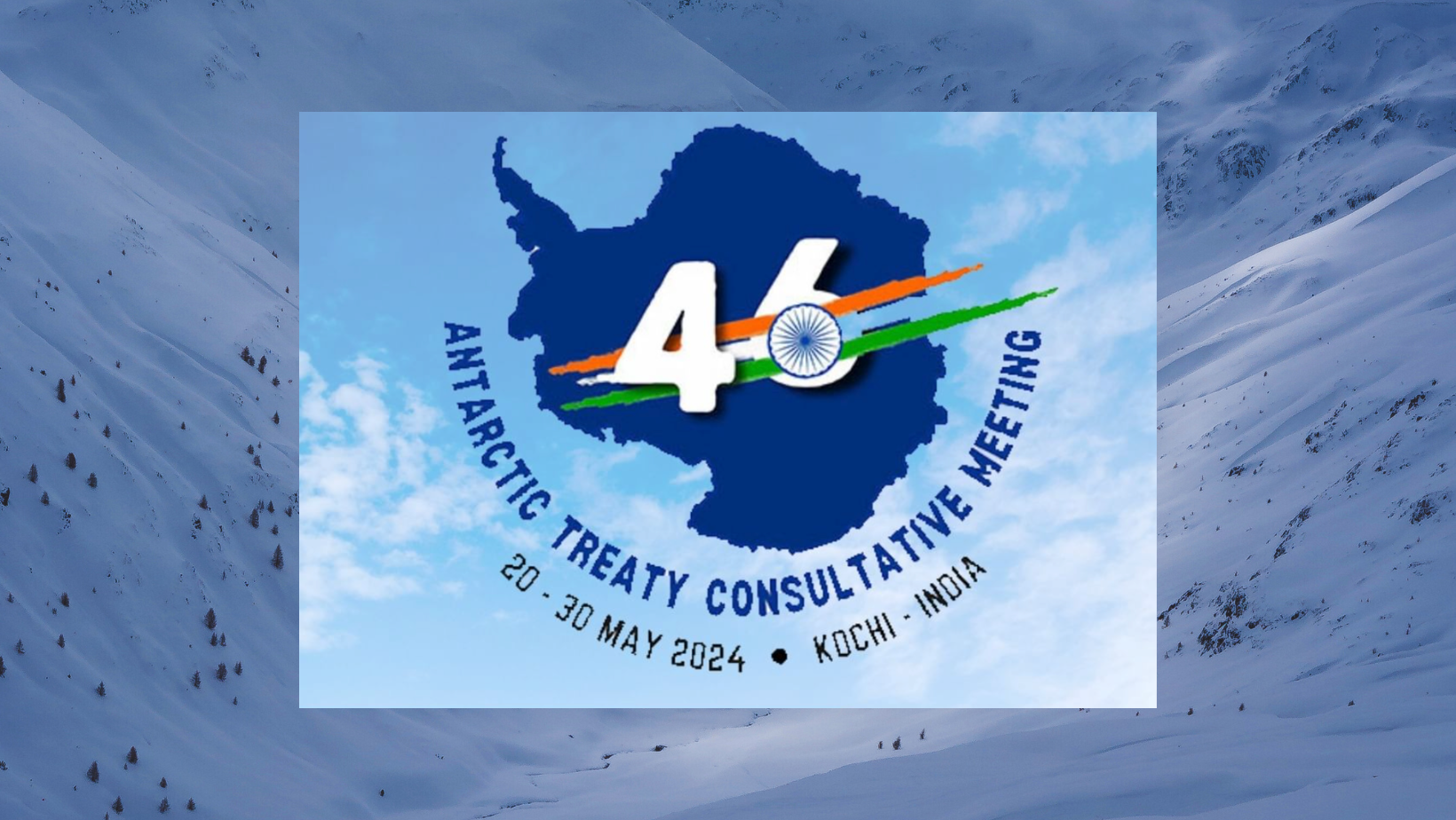
- 09 May 2024
Why is it in the News?
India is working with like-minded countries to promote regulated tourism in Antarctica as a steady increase in the number of tourists threatens to harm the fragile ecology in the White Continent.
About the Antarctic Treaty Consultative Meeting:
- The Antarctic Treaty Consultative Meeting (ATCM) is the annual meeting of the Parties to the 1959 Antarctic Treaty.
- The meeting serves as a platform for the exchange of information, discussion of common interests, and promotion of the principles and purposes of the Antarctic Treaty.
- The first ATCM was held in 1961, and initially occurred every other year, though the frequency has since increased.
- During the ATCM, representatives of the member countries address various issues related to Antarctica, such as environmental protection, scientific research, and tourism regulation.
- Key agenda items include strategic planning for sustainable management of Antarctica and its resources, policy, legal, and institutional operations, and biodiversity prospecting.
- The ATCM is organized by the Antarctic Treaty Secretariat, which is headquartered in Buenos Aires, Argentina, and was established in 2004.
- The Secretariat is responsible for facilitating communication and information exchange among the parties involved in the Antarctic Treaty System.
- In recent years, the ATCM has been hosted by various countries, with India hosting the 46th meeting in 2024.
- The Ministry of Earth Sciences (MoES), Government of India, through the National Centre for Polar and Ocean Research (NCPOR) and the Secretariat of the Antarctic Treaty will jointly organise the 46th Antarctic Treaty Consultative Meeting (ATCM 46) from 20 to 30 May 2024 at the Lulu Bolgatty International Convention Centre (LBICC) in Kochi, India.
What is the Antarctic Treaty?
- The Antarctic Treaty is an international agreement that aims to preserve and protect the Antarctic continent and its surrounding waters for scientific research and peaceful purposes.
- Signed on December 1, 1959, by 12 countries, the treaty came into effect on June 23, 1961.
- The treaty establishes Antarctica as a natural reserve devoted to scientific research, and it designates the area south of 60°S latitude as a region free of military and nuclear activities.
Key aspects of the treaty include:
-
- Freedom of scientific research and exploration, with cooperation among signatory nations
- Exchange of scientific information and personnel between treaty member nations
- Prohibition of military activities, such as the establishment of military bases or weapons testing
- Prohibition of nuclear explosions and disposal of radioactive waste
- Acknowledgement that no new territorial claims can be made on the continent
- Designation of Antarctica as a "Special Conservation Area" to protect its ecosystems and native species
- Currently, 54 countries have ratified the Antarctic Treaty, and 29 of these countries have Consultative Party status.
- Consultative Parties have the right to participate in decision-making processes related to the management and governance of the Antarctic region, while Non-Consultative Parties are encouraged to engage in scientific research and exchange information.
- On 12 September 1983, India became the fifteenth Consultative Member of the Antarctic Treaty.
- It participates in the decision-making process along with the other 28 Consultative Parties to the Antarctic Treaty.
- India’s first Antarctic research station, Dakshin Gangotri, was established in 1983.
- At present, India operates two year-round research stations: Maitri (1989) and Bharati (2012).
- The permanent research stations facilitate Indian Scientific Expeditions to Antarctica, which have been ongoing annually since 1981.
- In 2022, India enacted the Antarctic Act, reaffirming its commitment to the Antarctic Treaty.
UNITED NATIONS WORLD TOURISM ORGANISATION (UNWTO) (PIB)
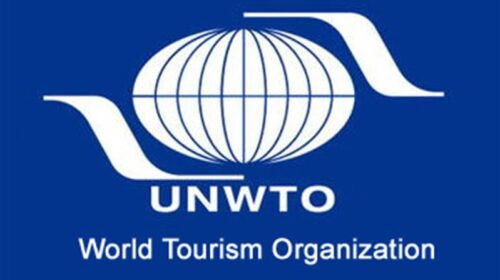
- 21 Oct 2023
What is the News ?
The Dhordo village in Gujarat's Kutch district was recently recognized as the Best Tourism Village by the United Nations World Tourism Organization (UNWTO), which was praised by India's Prime Minister.
Facts About:
- The United Nations World Tourism Organization (UNWTO) is a specialized agency of the United Nations responsible for promoting sustainable and responsible tourism on a global scale.
- Its functions include acting as a global forum for tourism policy issues and encouraging the adoption of the Global Code of Ethics for Tourism.
It was founded in 1975.
- Members: 159 countries are members of the UNWTO.
- Arabic, Chinese, English, French, Russian, and Spanish are the UNWTO's official languages.
- Structure of the organization:
The World Tourism Organization's General Assembly is the organization's main meeting.
It is made up of full members and associate members. It convenes every two years.
- The Executive Council serves as the UNWTO's governing body.
It is made up of 35 members, one for every five full members, who are elected by the General Assembly. It holds at least two meetings per year.
- Headquarters are in Madrid, (Spain).
